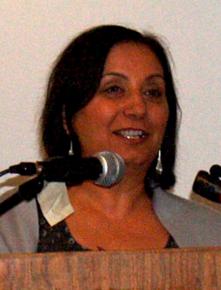Mobilizing teachers’ power
Jinny Sims is the former president of the British Colombia Teachers Federation (BCTF), who led the 46,000-strong union in a successful strike in 2005. The BCTF's 46,000 walked out in protest of budget cuts to education, large class sizes, and government attempts to take away collective bargaining rights and make teachers' job actions illegal.
Sims talked to and about the lessons of the British Columbia teachers strike.
WHY WAS your strike considered illegal, and what did it mean to have to take strike action that was against the law?
WE WERE in the middle of bargaining when the government legislated again and took away more of our rights.
We knew that if we took job action, it would be illegal, and we would be threatened. So we had a legal strike vote first, and then the government passed another piece of legislation to say we were illegal.
So we went back and took another vote. We organized meetings in every community--and you've got to realize that British Columbia is a huge province. We filled up hockey arenas, and we said, "Legislation's come down, our strike vote is illegal. Now we have a decision to make." And we gave them the reasons why they should still vote yes.
At the meeting where I spoke, they just wanted to rush out and vote. We said, "No, nobody can vote. You're going to sit there while we go through all the legal ramifications--including losing your home, which could happen."
Then, we said, "But if we don't do anything, then here's our other option: we just roll over, we might as well go to the government with the begging bowl and say, 'Do to us what you will, because us lot, we ain't gonna do anything back.'"
And they voted--and the vote was higher than the legal strike vote. The second vote was 90 percent of our 46,000 members.
We took the vote on Thursday, and we thought we would start the strike on Monday. But every meeting said, "We're not going in tomorrow." So we started on Friday. The government thought, "Let them have Friday, and Monday, they'll all be back at work." Monday came, we didn't go back to work.
Parents--even in areas where they'd never been able to mention the word "strike," really right-wing areas--would drive up in their cars and drop off food for the picket lines. This is all around the province. And, of course, we had great support from the labor movement as well. Workers walked out to support us for a day in the city where our legislature is. Public and private sector--everybody walked off the job. The non-unionized workers walked off the job, too, like the workers at the hotels we were using.
But that didn't happen overnight. It took time to build. You can't have that kind of an action out of the blue. You don't need four years--it can be done in six months. But you have to have a plan, you've got to go through that plan, and it's got to remain fluid.

HOW DID the strike change the teachers?
THE UNION became theirs again. We had young teachers who'd been teaching for 15 years who'd never taken part in any kind of job action. They had never seen the relevancy of the union. But the strike made them realize that to build a better world, you have to act as a collective.
It gave hope. It actually gave teachers power. But it did something else: It gave them their pride back. We need a place where teachers can meet and have these discussions, because the day-to-day grind of teaching just kills us, so we have no energy.
Teachers are very proud of their profession. So any threat to them is like a threat to that child they're teaching. When threats are coming from the right, I tell teachers they have two choices: Quit teaching or fight back.
WHO DO you think is behind the privatization agenda?
THE TRANSNATIONAL corporations. There's no doubt in my mind that the transnational corporations now control our government. With the exception of a couple of South American countries, no longer are we making decisions that are good for the collective state.
Governments have started to make decisions that are good for profit. British Columbia is a prime example. We're rolling in B.C. hydro [British Columbia's hydroelectric power]. We sell it to the Americans cheaper than we sell it to Canadians. We have wood. So we put more logs on trucks to go over the border, while mills are closing in the interior, and people are being decimated.
So for me, if you have a government that really cared about B.C. and the people who live there, they would be supporting those people instead of the trans-nationals.
WHAT'S YOUR philosophy of unionism?
WHAT FRAMED my presidency was what kind of union I wanted--which was a membership-driven union, with democratic and open processes. And by democratic, I don't mean just paying lip service to it. I mean real engagement for members. A publicly funded public education system, collective bargaining, decent wages and working conditions for teachers.
Basically, five core things helped define the decisions I made. Actually, even that's wrong, because I never felt that the decisions were mine to be made. They had to be made by the members. Even when we had our civil disobedience, leading up to it, we had five membership votes.
The proudest moment for me was after the final vote, when a reporter asked one of our members, "Aren't you upset that Jinny Sims is risking your career, and you could end up in prison?" Guess what the teacher said? "What do you mean? We are the BCTF. Jinny doesn't tell us what to do, we tell Jinny what to do."
The TV played that day after day, which changed the public debate about our strike.


